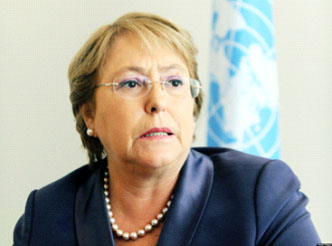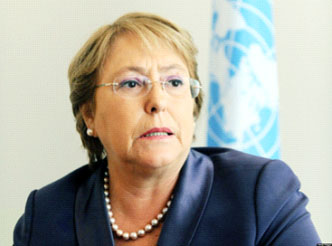SANTIAGO, Chile — When I interviewed President Michelle Bachelet earlier this week, there were news reports that she was ill or secluded and depressed by the latest polls showing that 75 per cent of the Chilean people disapprove of her presidency. But if she was any of that, she didn’t show it.
 Looking calm and confident during the interview at the presidential palace, she said that Chile — like much of South America — is suffering from an adverse international climate caused by China’s economic slowdown. She estimated that Chile’s economic growth will fall from 5 per cent annually in recent years to about 2.3 per cent this year.
Looking calm and confident during the interview at the presidential palace, she said that Chile — like much of South America — is suffering from an adverse international climate caused by China’s economic slowdown. She estimated that Chile’s economic growth will fall from 5 per cent annually in recent years to about 2.3 per cent this year.
To make things worse, recent political corruption scandals, including her son’s murky land purchase deal, and rising street crime rates have eroded trust in politicians and public institutions in a country that had long prided itself on being one of Latin America’s least corrupt and safest countries.
But Bachelet rejected claims by many Chileans that her leftist government deserves much of the blame for Chile’s current state of gloom.
Critics say her education, fiscal and labour reforms are destroying the pro-business economic policies that generated growth and reduced poverty in recent years. Over the past three decades, Chile has reduced poverty from 40 per cent to 7 per cent of the population, more than any other country in the region.

“Until recently, foreigners were asking us, ‘How has Chile done so well, so rapidly?’ Today, foreigners are asking us, ‘What’s wrong with Chile that it has abandoned what has worked so well for three decades?’” says Sebastian Pinera, former president and opposition leader. “We have gone from the ‘Chilean miracle’ to what many are describing as the ‘Chilean disappointment.’”
Bachelet told me that such gloomy views are exaggerated. A visitor to the capital who talks to business people and reads the mainstream media may get the impression that the country is in a deep crisis, “but if you go to other places in the country, the mood is totally different,” she said.
Yes, growth is down, but many poverty-stricken Chileans will get free access to education, and benefit from other social reforms, she said. “We tend to see the glass half empty, rather than half full,” she added.
I reminded her that her own minister of the presidency, Nicolas Eyzaguirre, the cabinet’s most powerful member, conceded to the daily El Mercurio last weekend that the government’s management of the reforms “hasn’t been good.” Eyzaguirre added that “we were immersed in a barrage of reforms that we wouldn’t have been able to appropriately design, nor to implement politically without provoking excessive conflicts.”
Asked whether she stands by her minister’s statements, Bachelet at first seemed to minimize their significance, saying that Eyzaguirre is in charge of passing the government reforms through congress, and that he was mainly referring to the fact that there were many bold reforms that were being pushed simultaneously.
But she added that her minister had also echoed a previous decision by her leftist coalition to “rethink” its reforms agenda and “see which are the real priorities” in light of worsening international conditions. That will be done without abandoning her government’s social reforms, she said. Chile needs economic growth, but also a better distribution of wealth, she said.
My opinion: Compared to its neighbours, Chile is doing reasonably well. While Chile is expected to grow by 2.3 per cent this year, Brazil’s economy is likely to show negative growth of -1.8 per cent, Venezuela’s economy is projected to post negative growth of -7 per cent, and Latin America’s average growth is expected to be a meager 0.5 per cent this year.
But Bachelet may have taken too long to conclude that she will have to “rethink” the pace of her reforms in light of the worsening economic climate. And — although she says she does — she may still be too slow to fully recognize that without economic growth, Chile won’t be able to eradicate poverty.
Economic conditions are likely to worsen for South America: China — the biggest buyer of the region’s commodity exports — is slowing down, many international investors are fleeing from emerging markets, and the US Federal Reserve might soon raise interest rates, making Latin America’s foreign debts more expensive to pay.
Bachelet needs to be more decisive, and give clear signals that in light of the new world economic conditions, Chile’s top priority must be to regain its previous growth rates. If she doesn’t focus on attracting investments and revamping the economy, she will not go down in history as a champion of the poor, but as the president who spoiled Latin America’s biggest success story in recent memory.










